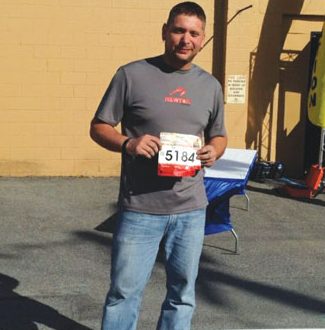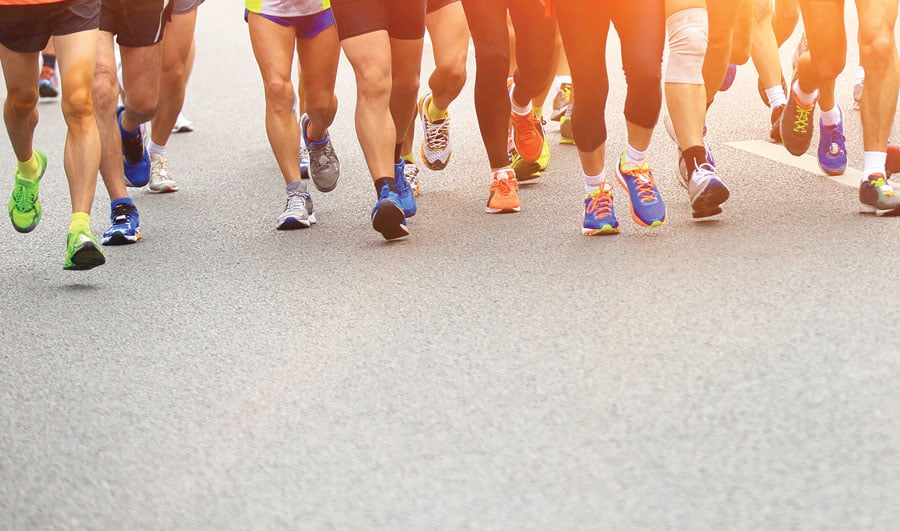Across the country—and especially in the South—opiate addiction is a catastrophe.
People have asked me if I have ever met anyone who has come off opiates successfully without substituting another opiate or drug. In over twenty years of medicine, I’ve known only one: Travis Muehleisen is a former opiate addict now running addict.
Muehleisen did not choose to take pain meds. He was given them by physicians after four back surgeries to treat spinal stenosis. Muehleisen was obese, weighing 330 pounds at the time. He also suffered from depression, high blood pressure, high cholesterol, and coronary artery disease.
“I didn’t like this way of life, but knew no other way,” says Muehleisen. “I knew I had to change or I was not going to be alive much longer.”
He decided to make a change. In the winter of 2010, he started walking a mile on the treadmill in his sister’s basement. Within a month, he was up to three miles.
The next summer, he ran his first lap around the track at Martinsburg High School. Slowly he kept increasing his distance, and a year later, he ran his first half marathon.
As an opiate user, Travis knew only one way to enter running: all in—and often to excess. “If I do not run and run hard, I literally feel pain,” says Muehleisen. “It takes me around six miles to get the substitute.”
Since he has started running, Muehleisen has lost over one hundred pounds from exercise and eating right. “I no longer take any medications. I am really proud of that, And I am in the best shape of my life and back to working full time.”

Travis is one of the few people I know who has come off disability. There is little incentive to work when you are getting a paycheck and insurance not to work. But Travis wants to work to keep his brain and body highly engaged. Desk job? Not for Travis. He is a steel worker and builds bridges.
Muehleisen is now six years opiate-free. He has run 14 marathons in 4 years and plans to run the JFK 50 Miler this fall. He recently shared these insights from the past six years:
What have you learned about running’s role in treatment of opiate addiction?
Running has shown me that there is a productive life after addiction. If you want a good life bad enough, it’s up to you to take control of it.
Do you think the symptoms of addiction ever go away?
Just speaking for myself, I don’t think the addiction ever goes away. I think addicts just learn to cope with it.
How do you feel if you miss running?
If I miss running, I find myself experiencing pain and depression.
Any other activity substitute in the same way?
I haven’t found anything to substitute this addiction with besides running and the challenge of it.
What advice would you give someone of pain medication now who wishes to get off them?
Stay strong. It’s a long journey but it’s very rewarding once you have it under control. Find something that challenges you physically and mentally and just dive in.
What do you think are the biggest barriers to people coming off the meds?
Believing in yourself, getting your self esteem back, trusting that there is a life after addiction, and mending the damage you have caused to family and friends.
Muehleisen’s Mental Marathon
When Travis Muehleisen ran his first full marathon, what got him through it was this:
Mile 1: I ran for God for giving me the strength and another chance at life.
Mile 2: For my two children, Jordan and Jessica, whom I love so very much.
Mile 3: For my parents, my father in heaven who always believed in me and my abilities to do anything I wanted to do. For my mother, for always being there for me through the good and the bad.
Mile 4: For my soul mate and best friend, T, for instilling confidence in me and for supporting me.
Mile 5: For all of those disabled who can’t run.
Mile 6: For those children being bullied.
Mile 7: For my family, for believing in me.
Mile 8: For people fighting cancer.
Mile 9: For the US troops for fighting for my freedom.
Mile 10: For all the victims affected by an act of mother nature.
Mile 11: For those who are homeless.
Mile 12: For all my medical doctors, especially for my neurosurgeon.
Mile 13: For all abused animals. Mile 14: For those struggling with addiction.
Mile 15: For all who are battling depression.
Mile 16: For all my true friends.
Mile 17: For all my coworkers.
Mile 18: For all my teachers and coaches.
Mile 19: For those suffering from hunger.
Mile 20: For children battling obesity.
Mile 21: For those who are missing loved ones.
Mile 22: For abused women and children.
Mile 23: For babies “born too soon.”
Mile 24: For Chandler (my boxer) and Mallory (my Maltese) for accompanying me on several runs.
Mile 25: For my health and happiness.
Mile 26: I ran for me, for having the guts and courage. And the last .2 I ran for chili and cheese nachos!








